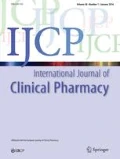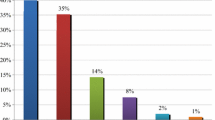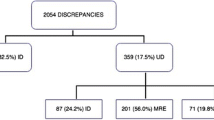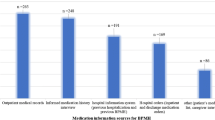Abstract
Objective To assess the impact of medication reconciliation interventions on medication error rates when elderly patients are discharged from hospital to community care or nursing homes.Setting Elderly patients (>65 years) living in nursing homes or in their own homes with care provided by the community nursing system. Method All medical records containing information on drug treatment were collected from hospital departments, the community care service and GPs. We then identified if there were any changes in the transfer of information i.e. if the drugs were not the same as before the transfer. Two different persons independently evaluated all information about the patients’ drugs to identify medication errors for three different time periods. During all three periods structured discharge information was used. In period 2, electronic medication lists were introduced and in period 3 we introduced specific routines and support by a clinical pharmacist to ensure prescription in the specific medication dispensing system (ApoDos). Asymptotic Linear by–Linear Association Test was used to compare number of medication errors in period 1, 2 and 3 respectively. Main outcome measure Number of medication errors per patient. Results A total of 123 patients were evaluated at discharge. For the 109 patients using the ApoDos system, there were significant differences in the number of medication errors between period 1 and 3 (P = 0.048), period 2 and 3 (P = 0.037 but not between period 1 and 2 (P = 0.41). The mean numbers of errors were 1.5, 1.1 and 0.5 for period 1, 2 and 3 respectively. The 14 patients not using the ApoDos system had on average 0.4 errors per patient. Among the 58 patients with medication errors, 34 were evaluated as having low clinical risk, 22 moderate, and 2 high clinical risk. Conclusion Medication errors are still common when elderly patients are transferred from hospital to community/primary care. The main risk factor seems to be the specific medication dispensing system (ApoDos) or rather the process on how to use it. When this system was supported by clinical pharmacists, the error rate dropped to the same level as for patients without ApoDos.

Similar content being viewed by others
References
Lisby M, Nielsen LP, Mainz J. Errors in the medication process: frequency, type, and potential clinical consequences. Int J Qual Health Care. 2005;17(1):15–22.
Tam VC, Knowles SR, Cornish PL, Fine N, Marchesano R, Etchells EE. Frequency, type and clinical importance of medication history errors at admission to hospital: a systematic review. CMAJ. 2005;173(5):510–5.
Strand LM, Morley PC, Cipolle RJ, Ramsey R, Lamsam GD. Drug-related problems: their structure and function. Dicp. 1990;24(11):1093–7.
Beijer HJ, de Blaey CJ. Hospitalisations caused by adverse drug reactions (ADR): a meta-analysis of observational studies. Pharm World Sci. 2002;24(2):46–54.
Lazarou J, Pomeranz BH, Corey PN. Incidence of adverse drug reactions in hospitalized patients: a meta-analysis of prospective studies. JAMA. 1998;279(15):1200–5.
Azaz-Livshits T, Levy M, Sadan B, Shalit M, Geisslinger G, Brune K. Computerized survelliance of adverse drug reactions in hospital: pilot study. Br J Clin Pharmacol. 1998;45(3):309–14.
Bates DW, Spell N, Cullen DJ, Burdick E, Laird N, Petersen LA, et al. The costs of adverse drug events in hospitalized patients. Adverse drug events prevention study group. JAMA. 1997;277(4):307–11.
Classen DC, Pestotnik SL, Evans RS, Lloyd JF, Burke JP. Adverse drug events in hospitalized patients. Excess length of stay, extra costs, and attributable mortality. JAMA. 1997;277(4):301–6.
Winterstein AG, Sauer BC, Hepler CD, Poole C. Preventable drug-related hospital admissions. Ann Pharmacother. 2002;36(7–8):1238–48.
Mjörndal T, Boman MD, Hägg S, Bäckström M, Wiholm BE, Wahlin A, et al. Adverse drug reactions as a cause for admissions to a department of internal medicine. Pharmacoepidemiol Drug Saf. 2002;11(1):65–72.
Dean B, Schachter M, Vincent C, Barber N. Prescribing errors in hospital inpatients: their incidence and clinical significance. Qual Saf Health Care. 2002;11(4):340–4.
Runciman WB, Roughead EE, Semple SJ, Adams RJ. Adverse drug events and medication errors in Australia. Int J Qual Health Care. 2003;15(1):i49–59.
Midlöv P, Deierborg E, Holmdahl L, Höglund P, Eriksson T. Clinical outcomes from the use of medication report when elderly patients are discharged from hospital. Pharm World Sci. 2008;30(6):840–5.
IHI MedReconcilliation. Prevent adverse drug events. Cited 16 Dec 2011. Available from: http://www.ihi.org/IHI/Programs/Campaign/ADEsMedReconciliation.htm.
Midlöv P, Holmdahl L, Eriksson T, Bergkvist A, Ljungberg B, Widner H, et al. Medication report reduces number of medication errors when elderly patients are discharged from hospital. Pharm World Sci. 2008;30(1):92–8.
National Institute for Health and Clinical Excellence. Technical patient safety solutions for medicines reconciliation on admission of adults to hospital. 2007 Cited 16 Dec 2011; Available from: http://www.nice.org.uk/guidance/index.jsp?action=byID&o=11897.
Midlöv P, Bergkvist A, Bondesson A, Eriksson T, Höglund P. Medication errors when transferring elderly patients between primary health care and hospital care. Pharm World Sci. 2005;27(2):116–20.
Bondesson A, Hellström L, Eriksson T, Höglund P. A structured questionnaire to assess patient compliance and beliefs about medicines taking into account the ordered categorical structure of data. J Eval Clin Pract. 2009;15(4):713–23.
Bergkvist A, Midlöv P, Höglund P, Larsson L, Bondesson A, Eriksson T. Improved quality in the hospital discharge summary reduces medication errors–LIMM: landskrona integrated medicines management. Eur J Clin Pharmacol. 2009;65(10):1037–46.
Bergkvist A, Midlöv P, Höglund P, Larsson L, Eriksson T. A multi-intervention approach on drug therapy can lead to a more appropriate drug use in the elderly. LIMM-Landskrona integrated medicines management. J Eval Clin Pract. 2009;15(4):660–7.
Hellström LM, Bondesson A, Höglund P, Midlöv P, Holmdahl L, Rickhag E, et al. Impact of the Lund integrated medicines management (LIMM) model on medication appropriateness and drug-related hospital revisits. Eur J Clin Pharmacol. 2011;67(7):741–52.
Scarsi KK, Fotis MA, Noskin GA. Pharmacist participation in medical rounds reduces medication errors. Am J Health Syst Pharm. 2002;59(21):2089–92.
Mills PR, McGuffie AC. Formal medicine reconciliation within the emergency department reduces the medication error rates for emergency admissions. Emerg Med J. 2010;27(12):911–5.
Acknowledgments
We would like to thank the staff at the Department of Internal Medicine at Landskrona Hospital and the nurses in the community health care.
Funding
We are grateful to the Governmental Funding of Clinical Research within the NHS (ALF) and the National Board of Health and Welfare for funding the study.
Conflicts of interest
There are no conflicts of interest.
Author information
Authors and Affiliations
Corresponding author
Rights and permissions
About this article
Cite this article
Midlöv, P., Bahrani, L., Seyfali, M. et al. The effect of medication reconciliation in elderly patients at hospital discharge. Int J Clin Pharm 34, 113–119 (2012). https://doi.org/10.1007/s11096-011-9599-6
Received:
Accepted:
Published:
Issue Date:
DOI: https://doi.org/10.1007/s11096-011-9599-6




